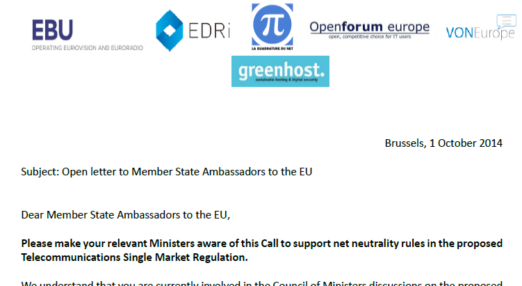Our work
EDRi is the biggest European network defending rights and freedoms online. We work to to challenge private and state actors who abuse their power to control or manipulate the public. We do so by advocating for robust and enforced laws, informing and mobilising people, promoting a healthy and accountable technology market, and building a movement of organisations and individuals committed to digital rights and freedoms in a connected world.
Filter resources
-

Despite compromising document, Malmström is here to stay
On 29 September the public hearing on Cecilia Malmström, the EU Commissioner-designate for Trade took place. The day before, Der Spiegel published an article revealing an email exchange indicating that Malmström and/or her cabinet had been covertly working with the US at an early stage in the development of the European Commission’s General Proposal for […]
Read more
-

Romania: The aftermath of the second CCR data retention ruling
As previously reported in the EDRi-gram, the Romanian Constitutional Court (CCR) ruled in its decision no. 440 on 8 July 2014 that the second Romanian data retention law (no. 82/2012) was not constitutional. The full reasoning for this was published in the Official Journal on 4 September 2014 in Romanian. EDRi-member ApTI is working on […]
Read more
-

Italy: Administrative copyright enforcement unconstitutional?
Leggi l’articolo in italiano qui: https://edri.org/italia-procedimento-amministrativo-incostituzionale-sul-diritto-d-autore On 26 September 2014, an Italian regional administrative tribunal referred a question regarding the constitutionality of the administrative enforcement procedures foreseen by a new regulation on online copyright infringement to the Italian Constitutional Court. The Regulation on Online Copyright Infringement entered into force on 1 April 2014. It allows […]
Read more
-

Italia: procedimento amministrativo incostituzionale sul diritto d’autore?
Read this article in English here: https://edri.org/italy-admin-copyright-enforcement-unconstitutional Il 26 Settembre 2014, un tribunale amministrativo italiano ha rinviato la questione relativa alla costituzionalità del procedimento amministrativo previsto dal nuovo Regolamento sulla violazione del diritto d’autore online alla Corte Costituzionale Italiana. Il Regolamento sulla Violazione del Diritto d’Autore Online é entrato in vigore il 1° aprile 2014. Questo […]
Read more
-

Finland: Complaints about the copyright law drafting procedure
An update to the copyright law is being prepared in the Copyright Commission of the Ministry of Education and Culture in Finland. To affect the outcome of the preparations, and help correcting excessive interpretations of the current copyright laws, a citizens’ initiative “Common Sense For Copyright” was launched by the Open Ministry, a non-profit organisation […]
Read more
-

Turkey: Constitutional Court overturns Internet law amendment
On 8 September, the Turkish Government passed an amendment to the existing Internet law (#5651). On 2 October, however, Turkey’s Constitutional Court annulled the most crucial parts of the amendment. The amendment that was passed “aims to protect the dignity and privacy of individuals who become victims of defamation on the Internet.” It provided a […]
Read more
-

Net neutrality: NGOs and industry join forces in an open letter to EU ministers
Today, EDRi together with several NGOs, consumer groups and industry representatives sent an open letter to the Council of the European Union, calling for Telecoms ministers to support strong net neutrality rules in the EU. The Council is currently reviewing the proposal of the Telecoms Single Market Regulation, voted on by the European Parliament in […]
Read more
-

ENDitorial: Italian position on IP Enforcement – the essence of insanity?
On 11 September, the Italian Presidency of the European Union submitted a discussion paper to the Council (see link below). The paper explains that, following the “review of Directive 2004/48/EC”, the controversial, so-called “Intellectual Property Rights Enforcement Directive” (IPRED) and the public consultation, it is “clear that the current legislative framework is not necessarily fit […]
Read more
-

Risk-based approach to data protection: risky for fundamental rights
On 18 September an EU Council document related to the draft EU data protection regulation was published. The document summarises the positions of Member States that have given their views on a so-called “risk-based approach to data protection”, within the context of the (so far) 30-month negotiations on a review of European data protection legislation. […]
Read more
-

Romania: Mandatory prepaid SIM registration ruled unconstitutional
The Romanian Constitutional Court (CCR) ruled on 16 September 2014 that a law that required the mandatory registration of all prepaid SIM cards and free WiFi users, is unconstitutional, as a whole. The Court reviewed the law as a result of the Romanian Ombudsman’s objection concerning its possible unconstitutionality. Several human rights NGOs asked the […]
Read more
-

France adopts anti-terror law eroding civil liberties
On 18 September 2014, the near empty French National Assembly adopted the “law strengthening the provision relating to the fight against terrorism”. In an atmosphere marked by “apocalyptic” anxiety and speeches on the terrorist threat, particularly within the Internet, minister Bernard Cazeneuve and rapporteur Sébastien Pietrasanta wore down all opposition, blocking any further reflection on […]
Read more
-

Panoptykon called on MEPs to stop mass surveillance
On 11 September 2014 digital right activists and advocates around the world commemorated the anniversary of 9/11 terrorist attacks on the WTC as the Freedom not Fear Day. It reminded decision makers and society as a whole that “absolute security” is a fallacy that can never be achieved, even in return for giving up all […]
Read more
